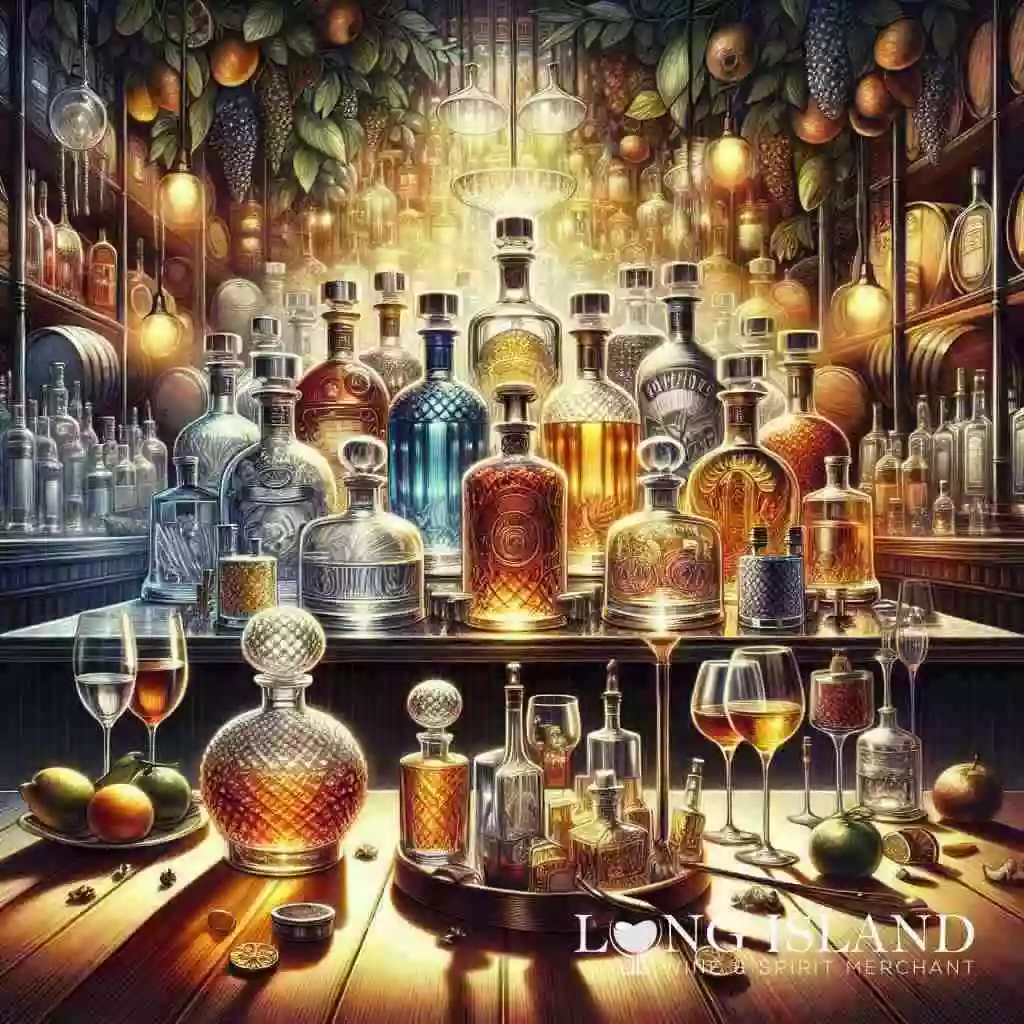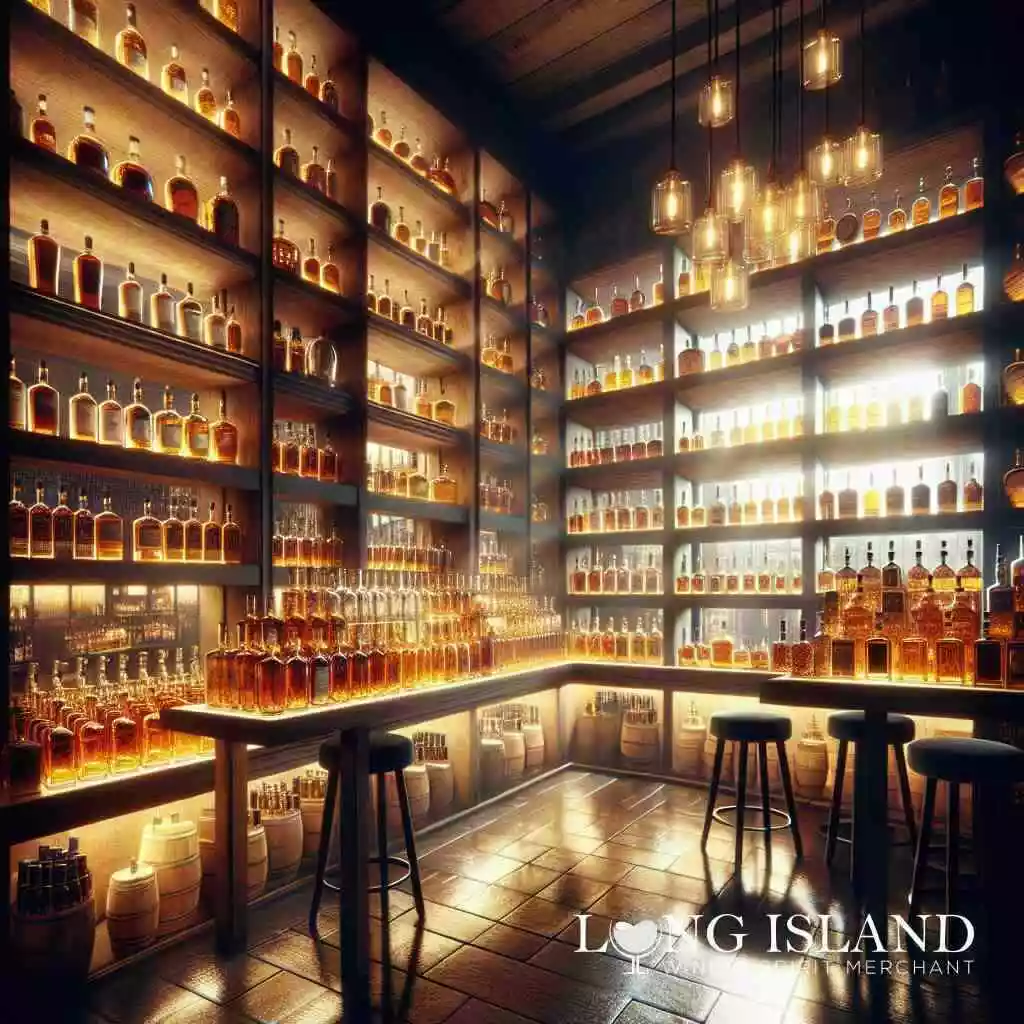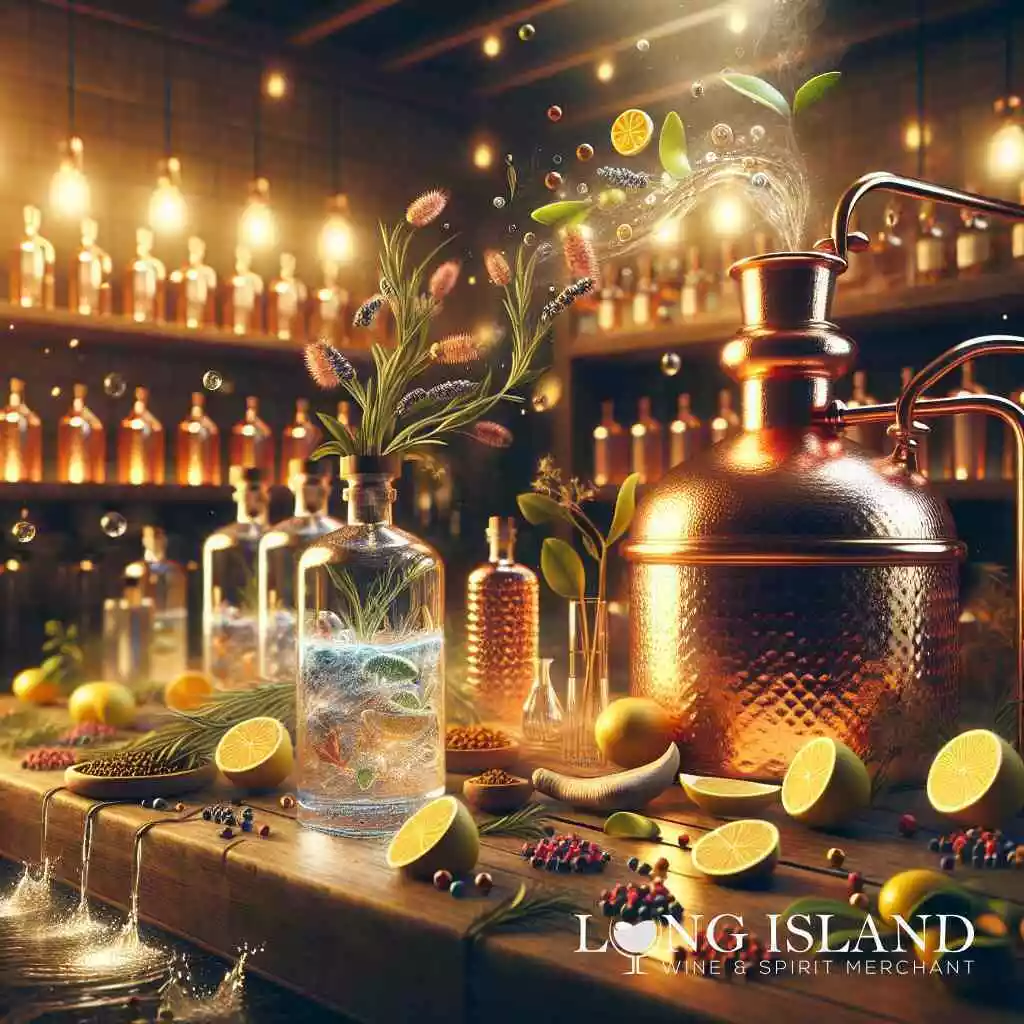
How to Run a Liquor Store?
May 25, 2024
Uncorking Success in Liquor Store Management
Understanding the Essentials of Liquor Store Management
The journey to run a successful liquor store begins with mastering the essentials of liquor store management. This involves more than just keeping the shelves stocked, it requires a deep understanding of business operations, customer service, and financial management. A strong foundation in these areas enables store owners to navigate the complexities of the retail liquor market efficiently. Managing a liquor store also demands vigilance in monitoring inventory levels, understanding customer preferences, and staying updated with the latest industry trends. Effective management practices are crucial for maintaining a competitive edge in a saturated market. For those looking to enhance their management prowess, diving into liquor store management essentials can provide valuable insights and strategies tailored to the unique challenges of the alcohol retail sector.
Navigating Alcohol Licensing and Regulations
Operating a liquor store in New York or any other state involves navigating a complex web of alcohol licensing and regulations. These laws can vary significantly from one jurisdiction to another, affecting everything from store location to operation hours. In New York, for instance, compliance with state-specific regulations is mandatory for running a legal and profitable business. Owners must stay informed about the necessary permits and licensing required to sell alcoholic beverages while ensuring that their operations adhere to the local, state, and federal laws. Understanding these regulations is not just about legal compliance but also about protecting your business from potential fines and legal issues. Alcohol licensing and regulations in New York provide a framework within which stores must operate, making it paramount for owners to stay current with any changes to these laws.
Maximizing Profit Margin Optimization
One of the critical challenges liquor store owners face is maximizing their profit margins. This requires a strategic approach to pricing, inventory management, and marketing. Developing profit margin strategies for liquor stores involves analyzing sales data to identify high-demand products and adjusting inventory levels accordingly. Promotional strategies, such as discounts on slow-moving items and upselling premium products, can also play a significant role in improving profitability. Furthermore, leveraging relationships with suppliers to negotiate better purchase prices can significantly reduce costs and enhance margins. Implementing effective profit margin strategies for liquor stores is essential for sustaining growth and ensuring the long-term success of the business.
Shelf Strategy: Stocking for Success
Effective Inventory Management Techniques
Implementing effective inventory management techniques for alcohol retail is crucial for the success of any liquor store, including those run by Liquor Store Open in Commack, New York. Proper inventory management ensures that the store remains well-stocked with a wide variety of gin, rum, vodka, whiskey, and other spirits that cater to the tastes of a broad customer base. It involves diligently tracking sales trends, predicting customer demand, and minimizing overstock to prevent wastage. By utilizing data-driven strategies to forecast needs, store owners can maintain an optimal inventory level that meets consumer demand without tying up too much capital in stock. This approach helps in sustaining high customer satisfaction by ensuring popular items are always available, while also optimizing the store’s financial health through efficient stock rotation.
Craft and International Spirits Sourcing
Sourcing craft and international spirits is a strategic way for liquor stores to distinguish themselves in a competitive market. Shoppers at Liquor Store Open have access to a treasure trove of fine spirits, from domestic craft options to exotic international brands. This variety appeals to consumers seeking unique and high-quality alcoholic beverages for their collections or special occasions. Building relationships with distilleries and suppliers worldwide enables store owners to offer a diverse product range that encompasses luxury, craft, and specialty drinks. Moreover, embracing craft and international spirits meets the growing consumer interest in exploring new flavors and stories behind the bottles, enhancing the retail experience and encouraging repeat visits.
Seasonal Inventory Planning for Festive Drinks
Seasonal inventory planning plays a pivotal role in catering to changing consumer preferences throughout the year. Check out our Exploring Fine Wines Near Me 2024 Guide for seasonal suggestions. Anticipating the demand for festive drinks during specific seasons or holidays allows liquor stores to adapt their inventory accordingly. By engaging in seasonal inventory planning in the liquor business, Liquor Store Open ensures that its shelves are stocked with holiday favorites, such as spiced rum for winter celebrations or refreshing cocktails ingredients for summer gatherings. This strategy not only boosts sales during peak seasons but also enhances customer satisfaction by providing them with the products they seek for their festivities. Careful planning and market analysis enable stores to maximize their sales potential by aligning their inventory with consumer demands during these critical shopping periods.
The Art of Customer Attraction and Retention
Demographic Analysis for Targeted Marketing
To attract and retain customers effectively, engaging in demographic analysis for liquor store marketing is indispensable. Understanding the preferences, buying habits, and demographics of your target market in Commack, New York, is critical. By analyzing data such as age, income, and drinking preferences, Liquor Store Open can craft marketing strategies that resonate with their audience. Tailored advertisements and promotions based on demographic insights ensure that messaging feels more personal and relevant, significantly improving engagement rates. Moreover, this targeted approach helps in inventory selection, ensuring the store stocks high-demand products preferred by the local community, thus driving foot traffic and fostering loyalty among customers.
Creating Customer Loyalty Programs
Developing lasting relationships with customers goes beyond the initial sale. Implementing creative customer loyalty programs for wine shops can turn occasional shoppers into loyal patrons. Loyalty programs at Liquor Store Open, such as rewards for frequent purchases, exclusive discounts for members, or personalized wine and spirits recommendations, encourage repeat business by offering tangible value. These programs not only incentivize purchases but also create a community of brand advocates that promote the store through word-of-mouth. Additionally, integrating social media initiatives alongside loyalty programs can amplify their reach, encouraging more customers to take part and remain engaged with the brand over time.
Employee Training for Customer Service Excellence
Exceptional customer service is the backbone of any successful retail operation, especially in a liquor store. Investing in customer service excellence training equips employees with the knowledge, skills, and attitude needed to deliver outstanding service that exceeds customers’ expectations. Training programs at Liquor Store Open focus on product knowledge, including understanding the nuances of different spirits, wines, and beers, as well as soft skills like communication and problem-solving. Empowered employees who can provide expert recommendations and resolve issues efficiently contribute significantly to a positive shopping experience. By prioritizing customer service excellence, Liquor Store Open ensures that every customer leaves satisfied, fostering a loyal customer base that is key to the store’s growth and success in the long term.
The Digital Vineyard: Growing Sales Online
E-commerce strategies for online liquor sales
In today’s digital age, having a robust e-commerce platform is essential for liquor stores aiming to extend their reach beyond the local foot traffic. Liquor Store Open leverages e-commerce strategies for online alcohol sales by providing an intuitive online shopping environment that mirrors the bespoke experience customers enjoy in-store. This includes offering detailed product descriptions, high-resolution images, and customer reviews to inform buyers’ decisions. Moreover, tailoring the user experience with personalized recommendations based on browsing and purchase history enhances customer satisfaction and increases sales. An optimally designed website coupled with an efficient, secure checkout process ensures that wine and spirit enthusiasts can easily navigate and make purchases, driving online sales growth for the business.
Alcohol trend monitoring and online promotions
Staying ahead in the competitive liquor market requires an acute awareness of changing tastes and preferences. By focusing on alcohol trend monitoring and adaptation, Liquor Store Open identifies emerging trends in the alcoholic beverage industry, from craft beer revolutions to the resurgence of classic cocktails. This insight allows for strategic product curation that appeals to both connoisseurs and casual drinkers. Furthermore, leveraging these trends through timely online promotions and marketing campaigns can captivate and engage a wider audience. Special email newsletters, blog posts featuring “how-to” mixology videos, and limited-time offers on trending products are effective ways to drive traffic and increase online sales while establishing the store as a go-to source for the latest in liquor innovation.
Social media marketing for liquor stores
Effective use of social media is paramount for liquor stores looking to build a vibrant community of enthusiasts and casual drinkers alike. Implementing targeted social media marketing strategies for liquor outlets helps Liquor Store Open connect with its audience on a more personal level. Platforms like Instagram and Facebook are ideal for showcasing new arrivals, sharing drink recipes, and announcing in-store events or online promotions. Engaging content that resonates with the target audience, such as mixology tutorials, behind-the-scenes looks at the store operations, or highlights from local distillery visits, fosters interaction and encourages followers to share their experiences. By maintaining an active and engaging online presence, Liquor Store Open not only attracts new customers but also strengthens loyalty among existing ones, demonstrating the power of social media in driving both online and in-store sales. Read more on our blog post about Cachaca? A Beginner’s Guide.
Design That Sells: Store Layout and Aesthetics
Liquor store layout design for an inviting atmosphere
When stepping into Liquor Store Open in Commack, New York, customers are immediately greeted by an atmosphere that beckons exploration. This inviting ambiance is no accident but the result of meticulous liquor store layout design for better customer experience. The store layout is strategically planned to guide customers through a journey of discovery, from the latest craft spirits to vintage wines that speak of age-old traditions. Aisles are wide and well-organized, allowing for easy navigation while highlighting promotions and new arrivals. Lighting plays a crucial role as well, with spotlights illuminating premium bottles and creating a warm, welcoming environment. By emphasizing a layout that promotes product exploration and interaction, Liquor Store Open has mastered the art of creating an atmosphere that not only draws customers in but also encourages them to stay, browse, and eventually, make a purchase.
Store branding and aesthetics
In the competitive world of liquor sales, establishing a strong brand identity is vital. At Liquor Store Open, every element of the store’s design contributes to a cohesive story that resonates with its clientele. The branding extends beyond logos and signage, it encompasses the very aesthetics of the store itself-from the color palette that reflects the richness of fine spirits to the material choices evoking a sense of quality and craftsmanship. This attention to detail in store branding and aesthetics ensures that customers have a memorable shopping experience, associating their visit with a sense of luxury and exclusivity. The store becomes not just a place to buy alcohol but a destination that customers want to revisit and share with others, thereby bolstering loyalty and word-of-mouth promotion.
Creating an engaging shopping experience with retail technology
In an era where digital and physical retail spaces increasingly intersect, integrating advanced retail technology is paramount for enhancing the customer experience. Liquor Store Open leverages cutting-edge solutions such as interactive kiosks where customers can learn more about their favorite drinks, virtual mixology classes, and an app that personalizes recommendations based on past purchases and taste preferences. This embrace of technology transforms the shopping process into an engaging, interactive journey, allowing customers to not only make informed purchasing decisions but also to discover new favorites. QR codes placed strategically around the store provide instant access to product stories, reviews, and pairings, further enriching the customer’s visit. By creating an engaging shopping experience with retail technology, Liquor Store Open ensures that it stays at the forefront of the industry, meeting the modern consumer’s desire for a seamless blend of digital and in-store shopping.
Behind the Counter: Operations and Compliance
Compliance with Local Alcohol Regulations
Running a successful liquor store like Liquor Store Open in Commack, New York, demands strict compliance with local alcohol rules on Long Island. The maze of regulations governing the sale of alcohol can intimidate, but adherence ensures the longevity and legitimacy of the business. This includes licensing requirements, which differ from one jurisdiction to another, and stipulations on operating hours, which can influence store profitability. Store owners must stay abreast of state and federal laws to preempt any legal issues that could arise from non-compliance. Regular audits and legal consultations can safeguard the business against potential fines and sanctions, promising a smooth operation and peace of mind for both the owners and their customers.
Age Verification Practices and Theft Prevention
Implementing rigorous age verification practices in liquor retail is not just a regulatory mandate but a moral obligation to the community. Liquor Store Open ensures that all employees are trained in recognizing valid identification documents and are knowledgeable about the latest methods to prevent underage sales. Digital age verification systems have become indispensable tools in enhancing the accuracy of verifications, thereby reducing the risk of human error. Moreover, theft prevention is another aspect closely linked to operations. Employing security measures like surveillance cameras, strategic store layouts that minimize blind spots, and training staff to recognize suspicious behaviors plays a crucial role in protecting assets and ensuring the safety of both staff and patrons.
Supplier Relations and Community Engagement
The heart of a thriving liquor store lies in its ability to offer a diverse selection of high-quality products. This is made possible through strong supplier relations and community engagement for liquor stores. Building a positive relationship with suppliers ensures access to the latest and most sought-after products, including craft and luxury spirits that can significantly differentiate a store like Liquor Store Open in the market. Additionally, engaging with the community through sponsorships, events, and feedback initiatives fosters goodwill and raises the store’s profile among potential customers. Create a sense of belonging and loyalty, turning the local community into a reliable customer base. Together, these strategies form a backbone for successful operations, combining adherence to regulations with the cultivation of meaningful connections.
Uncapping Future Trends: Innovation in Liquor Retail
Success in the retail liquor industry requires more than just a good selection and friendly service, it also demands a keen eye on the horizon for emerging trends and innovations. As the industry evolves, so too must Liquor stores Open. This section explores the forecast of innovation in the liquor retail space, emphasizing the significance of staying ahead through trend monitoring, integrating mixology into product selection, and leveraging craft and luxury spirits.
Monitoring and Adapting to Alcohol Trends
The liquor industry is as dynamic as it is diverse, with trends constantly shifting under the influence of consumer preferences, cultural shifts, and even technological advancements. For Liquor Store Open, monitoring and adapting to these trends is not just about catching the latest wave, it’s about understanding the undercurrents that propel the market forward. This could mean recognizing the rising popularity of low-ABV cocktails among health-conscious consumers or the resurgence of classic spirits like brandy and cognac. By staying abreast of these changes, Liquor Store Open positions itself as a leader rather than a follower, catering not just to current tastes but foreseeing future desires. Discover our insights on Your Guide to Commack’s Top Whiskey Picks.
Integrating Mixology and Cocktail Ingredients in Product Selection
One trend transforming the retail liquor landscape is the growing consumer interest in mixology and the art of cocktail making. This cultural shift has increased demand for not only premium spirits but also for the ingredients and knowledge necessary to create these drinks at home. Liquor Store Open embraces this trend by integrating mixology trends into liquor store product selection, offering customers a curated selection of bitters, syrups, and garnishes alongside an extensive range of spirits. Moreover, providing educational content such as mixology classes, cocktail recipes, and pairing guides can enhance customer experience, turning shopping from a mere transaction into an opportunity for recreation and learning.
Leveraging Craft and Luxury Spirits for Market Differentiation
In a market saturated with options, standing out requires something special. Liquor Store Open differentiates itself by embracing the renaissance of craft and luxury spirits. These bottles often come with stories of artisanal production methods, regional heritage, and unique flavor profiles that appeal to connoisseurs and casual drinkers alike. By leveraging craft and luxury spirits for market differentiation, Liquor Store Open not only caters to the growing demand for high-quality, distinctive products but also establishes itself as a destination for discerning customers seeking something beyond the ordinary. Highlighting these premium options in-store and online, through tastings, limited releases, and exclusive partnerships, reinforces the store’s commitment to quality and innovation.
In the rapidly evolving world of liquor retail, staying ahead means continuously scanning the horizon for the next big thing. Whether it’s adapting to the latest trends, integrating mixology into the shopping experience, or offering an unmatched selection of craft and luxury spirits, Liquor Store Open is committed to innovation. This forward-thinking approach not only aligns with the current market dynamics but sets the stage for future growth, ensuring Liquor Store Open remains a cherished resource for enthusiasts and casual drinkers for years to come.
Raising the Bar: Conclusion and Future Outlook
Summarizing Key Takeaways for Running a Successful Liquor Store
The journey to running a successful liquor store such as Liquor Store Open involves various facets, from insightful management practices to innovative customer engagement strategies. It starts with a foundational understanding of liquor store management, where navigating the intricacies of inventory, licensing, regulations, and maximizing profit margins are paramount. Key strategies for shelf success emphasize the significance of effective inventory management, the sourcing of craft and international spirits, and the anticipatory measures for seasonal inventory planning to meet consumer demands.
Customer attraction and retention are achieved through targeted demographic marketing, the creation of compelling loyalty programs, and a relentless focus on customer service excellence. Advancements in digital retail, specifically e-commerce strategies for online liquor sales, social media marketing, and incorporating retail technology, further propel sales growth and enhance customer experiences.
Moreover, the design of the store layout and the thoughtful incorporation of aesthetics significantly contribute to creating an inviting atmosphere that entices customers to explore and purchase. Operations and compliance underscore the importance of adhering to local regulations, implementing age verification practices, and fostering strong supplier relations and community engagement.
The Evolving Landscape of the Liquor Industry
The liquor industry is continuously shifting, with emerging trends in consumer preferences, technological advancements, and innovative retail practices reshaping the marketplace. As observed, the demand for craft and luxury spirits, online sales, and the increasing role of mixology underscore the dynamic nature of the industry. Retailers face the challenge and opportunity of adapting to these changes to remain competitive and relevant. The integration of digital platforms for online sales strategies for alcoholic beverages, coupled with the rise of experiential retail, signifies a pivotal transformation in how liquor stores operate and engage with their customers.
Vision for the Future of Liquor Store Open
Looking ahead, Liquor Store Open envisions a future where it not only continues to embrace these changes but leads the way in innovation within the liquor retail sector. As consumer preferences increasingly favor unique and high-quality spirits, Liquor Store Open is committed to expanding its selection of fine spirits, specialty drinks, and cocktail ingredients. It will further leverage technology to enhance the online shopping experience while maintaining the exceptional customer service that patrons have come to expect in-store.
The vision extends to playing a more significant role in the community, not just as a retail store but as a hub for cultural and educational events that celebrate the rich and diverse world of alcoholic beverages. From hosting mixology classes to offering tastings of rare finds, Liquor Store Open aims to cultivate a community of informed, enthusiastic patrons.
In conclusion, the future of Liquor Store Open looks vibrant and promising. With a steadfast commitment to quality, innovation, and community engagement, it aims to continue uncorking the extraordinary, one bottle at a time, while adapting to the ever-changing landscape of the liquor industry.
Frequently Asked Questions
Question: What are the key components of successful liquor store management as outlined in your blog ‘How to Run a Liquor Store?’?
Answer: Successful liquor store management, as detailed in our blog, revolves around several core components. These include having a strong grasp of inventory management to ensure your store remains well-stocked with a variety of high-demand products, including fine spirits and specialty drinks. Mastery of alcohol licensing and regulations is paramount to operate legally and avoid potential fines. Prioritizing customer service excellence is necessary to exceed customer expectations and foster loyalty. Adopting effective liquor store marketing strategies, particularly demographic analysis and alcohol trend monitoring, helps in engaging with your target market more effectively. Finally, compliance with regulation and integrating retail technology for an enhanced customer experience are key practices. Leveraging these strategies not only sets a solid foundation for running a liquor store but also ensures its growth and success in the competitive market.
Question: How does Liquor Store Open remain compliant with local alcohol regulations while maximizing profit margins?
Answer: At Liquor Store Open, compliance with local alcohol regulations is ensured through continuous monitoring and adaptation to any changes in the law, which are critical to our operations in Commack, New York, and our online services across all 50 states. Our team stays informed on the necessary permits and licensing, maintains rigorous age verification practices for all purchases, and employs theft prevention strategies to protect our assets. To maximize profit margins, we analyze sales data to optimize our inventory with high-demand products, engage in strategic marketing initiatives, and negotiate favorable terms with our suppliers. This balance of strict regulatory adherence and savvy business practices enables us to provide our customers with the best liquor online while ensuring the longevity and profitability of our business.
Question: Can you offer insights into how Liquor Store Open sources its wide range of craft and international spirits?
Answer: At Liquor Store Open, we take pride in our diverse selection of craft and international spirits, which is a direct result of our strategic sourcing practices. We build strong relationships with distilleries and suppliers both domestically and internationally to secure access to unique and sought-after products. Our dedicated team conducts careful research and market analysis to identify emerging trends in the liquor industry, ensuring we are always ahead in offering the latest in high-quality spirits, luxury drinks, and cocktail essentials. This commitment to variety and quality in our product selection strategy not only sets us apart in the competitive liquor market but also caters to the evolving tastes of our discerning clientele.
Question: How does Liquor Store Open use e-commerce and digital marketing strategies to enhance the online shopping experience?
Answer: Liquor Store Open leverages a robust e-commerce platform and dynamic digital marketing strategies to provide an unmatched online shopping experience. Our website is designed for ease of use, with detailed product descriptions, high-resolution images, and customer reviews. We personalize the shopping experience with product recommendations based on browsing and purchase history. For our digital marketing efforts, we employ targeted social media marketing strategies to connect with our audience, using platforms like Instagram and Facebook to showcase new arrivals, share drink recipes, and announce promotions. Furthermore, we monitor alcohol trends to curate our offerings and engage customers with content that resonates. These online initiatives not only drive sales but also strengthen our customer relationships by making shopping for liquor online convenient, informative, and enjoyable.
Question: What initiatives does Liquor Store Open institute to ensure customer loyalty and repeat business?
Answer: Liquor Store Open institutes several initiatives aimed at fostering customer loyalty and encouraging repeat business. We develop creative customer loyalty programs that offer rewards for frequent purchases, exclusive discounts for members, and personalized recommendations for wines and spirits. Additionally, we provide exceptional customer service, with a focus on employee training to ensure our team is knowledgeable about our products and can offer expert recommendations. Our engagement doesn’t end with a sale, we maintain active communication with our customers through social media and email newsletters, keeping them informed about the latest arrivals, upcoming in-store events, and online promotions. These efforts collectively contribute to building a community of loyal patrons who view Liquor Store Open as their trusted source for the best liquor online.




